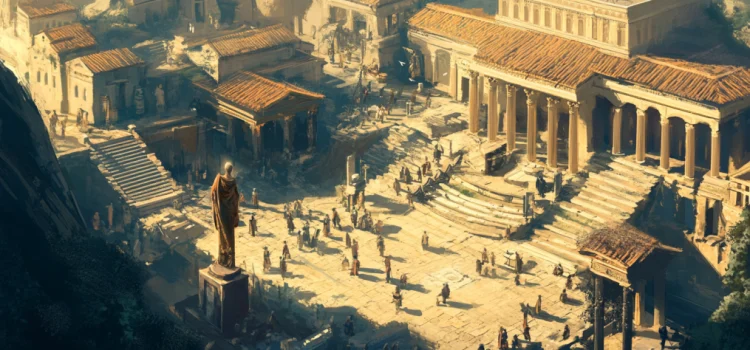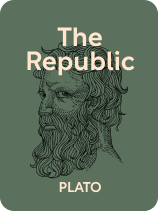

This article is an excerpt from the Shortform book guide to "The Republic" by Plato. Shortform has the world's best summaries and analyses of books you should be reading.
Like this article? Sign up for a free trial here.
How do societies evolve over time? What did ancient philosophers think about the progression of political systems?
Plato’s vision of societal change is explored in his seminal work The Republic. The Greek thinker outlines a descent from an ideal city-state through four increasingly flawed forms of government. His theory offers insights into the nature of power, justice, and human behavior.
Keep reading to understand Plato’s society model, and discover how his ideas still resonate in modern political discourse.
Plato on Society
According to Plato, society isn’t immune to change and, thus, it’s bound to deteriorate over time. In The Republic, he makes his argument through the character of Socrates.
Socrates describes societal decline in terms of four inferior cities (in relation to the ideal city), each worse than the one before:
- Timocracy: a society structured around honor and ambition
- Oligarchy: a society structured around wealth
- Democracy: a society structured around personal freedom
- Tyranny: a society structured around oppression and mob rule
In addition, he offers a personality representative of each, just as the philosopher-king represents the values of the ideal city. This continues his analogy of justice in society and justice in an individual. We’ll explain the nature of each inferior city and man, how they come to be, and why they’re inferior to the ideal city or philosopher-king.
(Shortform note: Many scholars interpret this section as Plato’s acknowledgment that the ideal city is not and cannot ever be real—he says that like all worldly things, the ideal city must decay. To him, ideals exist only in the realm of the forms where things are forever perfect and unchanging. However, it’s up for debate if Plato believes the ideal city is worth striving for in real life, or the extent to which he believes societies should try to emulate it.)
| The Representatives of The Republic Some scholars argue that the young men Socrates speaks with throughout The Republic correspond to the various city representatives Socrates describes. These scholars also suggest that Socrates is able to “elevate” these men by educating them about justice and the philosophical life, causing them to start acting like the next highest level representative—from oligarch to timocrat, for example. This elevation matches Socrates’s overall mission of providing the next generation of rulers with an education that will make them wiser and more just. |
Step #1: Timocracy
A timocracy is a society where politics revolve around military prowess and honor, explains Socrates. In a timocracy, military and political offices are the same, and rulers are judged by their military successes.
The ideal city starts becoming a timocracy when, by chance, there’s a generation of less competent rulers and protectors. They’ll provide inferior education to the next generation, starting a cumulative decline. This eventually leads to rulers and protectors who venerate the physical and military ideals of the city but lack philosophical knowledge. Without this knowledge, they can’t understand who belongs to which class. Incorrectly assigning citizens will cause civil strife, and the timocratic rulers and protectors will have to enforce stability through violence and oppression against the workers.
The Timocratic Man
Socrates describes the timocratic man as good-natured, conflicted, and ambitious. He wants to be excellent and values his physical and military training. His father—a philosopher—teaches him to avoid the corruption of public life and that goodness is reached through reason and knowledge. However, the rest of society judges his father harshly for his lack of military prowess and honor. The timocratic man tries to avoid this judgment while also maintaining some of his father’s principles. This middle ground between the desire for glory and the desire for goodness is ambition and a competitive drive.
The timocratic man also secretly desires wealth and the luxuries it provides. This is because his inferior education never convinced him that wealth corrupts—it just forced him to give it up.
Step #2: Oligarchy
An oligarchy is a society where wealth is equal to political power, explains Socrates. In an oligarchy, wealth is equated with goodness and is a requirement for ruling.
A timocracy becomes an oligarchy when secret desires for luxury cause timocrats to continue accumulating wealth. As they do, they become less interested in personal excellence and more interested in managing their riches. This eventually erodes and then reverses their belief that wealth is corrupting. Oligarchies often have incompetent rulers, as wealth doesn’t translate to political skill. In addition, the sharp divide between rich and poor in an oligarchy creates further civil strife as the poor become vagrants and criminals.
The Oligarchic Man
According to Socrates, the oligarchic man is only concerned with making money. A political scandal or failure destroyed the life of his father—a timocrat. In an attempt to avoid poverty and misery by any means necessary, the oligarchic man abandons his moral principles and directs his ambition exclusively toward gaining wealth. He’s only honest when it benefits his reputation as a businessman and only restrains his hedonistic desires out of stinginess. In addition, he’s not courageous and gives up easily since he has to abandon any pursuit that might lose him money.
Step #3: Democracy
A democratic society is defined by equal rights, freedoms, and political opportunities for all citizens, Socrates explains. In a democracy, people are free to live however they choose. Because of this, democratic societies have a lot of different ideas and perspectives.
An oligarchy becomes a democracy when younger generations spend their wealth extravagantly and without restraint. This is inevitable because maximizing profits requires enabling immoral behaviors—there’s money to be made not only in selling extravagant luxuries but also in exploiting the financially reckless. This also increases wealth inequality even further until there’s nothing but the desperately poor and the pampered, incompetent rich. When civil strife from inequality boils over, the poor revolt, overthrow the oligarchy, and grant everyone equal rights and opportunities.
The Democratic Man
Socrates describes the democratic man as flexible but unprincipled. His father—an oligarch—teaches him to be stingy, make money, and avoid unnecessary expenses. But others around him in society indulge in extravagance and excess, and the democratic man gets a taste for luxury from spending time with them. They tell him this extravagance is the best way to live, and the democratic man believes them because he hasn’t been taught strong moral principles. And so the democratic man takes a middle ground between his father’s views and his society: He doesn’t constantly indulge in excess but he’s not stingy either. He’s also unwilling to judge those who indulge or say any pleasure is good or bad.
Step #4: Tyranny
Socrates says a tyrannical society is governed by mob rule, violence, and oppression. It’s run by a single charismatic leader—a tyrant—who appeals to the people but only cares about himself.
A democracy becomes a tyranny through conflict between the rich and poor. In a democracy, the rich and poor have equal rights and freedoms but unequal wealth. Therefore, a charismatic leader can mobilize the poor by promising to persecute their enemies and redistribute wealth. Using the legal system and mob violence, this leader eliminates their political opponents and secures their power. They can then use wealth seized from the rich to hire a private army and oppress the masses for their personal benefit.
The Tyrannical Man
According to Socrates, the tyrannical man is ruled by his violent, animalistic desires. His father—a democrat—teaches him that indulging in pleasure is OK if he practices moderation. On the other hand, his society teaches him to indulge extravagantly as much as he likes. And since his father refuses to judge people for indulging in pleasures, he doesn’t stop the tyrannical man from giving himself over to his desires. The tyrannical man spends his time having wild orgies, getting drunk, and eating to excess. When he runs out of money to feed his habits, he lies and cheats to get more. If that fails, he robs and kills people.
Exercise/Discussion
Do you agree with the way Plato ranks the various cities (the ideal city on top, then timocracy, oligarchy, democracy, and finally tyranny)? If not, how would you rank them and why?

———End of Preview———
Like what you just read? Read the rest of the world's best book summary and analysis of Plato's "The Republic" at Shortform.
Here's what you'll find in our full The Republic summary:
- Plato’s concept of justice
- Why living a moral life is good for its own sake
- How later philosophers interpreted and responded to the ideas in The Republic






